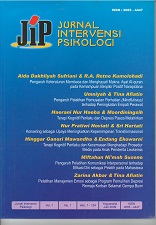Main Article Content
Abstract
Yogyakarta's earthquake survivors oñen show depression symptoms. This study is aimed to recognize the effectiveness of emotional management training on mitigating depressed adolescents of Yogyakarta's earthquake survivors. Twenty participants enrolled within, which are categorized into experiment and control group. The participant's characteristics were: second year in junior high school, survivors of Yogyakarta's earthquake, age ranging from 13 to 15. The hypotheses sugaest that emotional management training is effective to decrease depression among adolescents of Yogyakarta's earthquake victim. Beck Depression Inventory was conducted before, after, and at the follow-up to measure depression. Result shows that emotional management training is effective in decreasing depression among adolescents of Yogyakarta's earthquake survivors. Qualitative analysis found that individuals which shows higher hate of declining depression score have different emotion management process compared to the lower. It suggested to next research to focus continously to improve the effectiveness of the training.
Keywords: Yogyakarta's earthquake survivors, Emotion Management Training, Depression
Article Details
Authors who publish with this journal agree to the following terms:
- Authors retain copyright and grant the journal right of first publication with the work simultaneously licensed under a Creative Commons Attribution-ShareAlike 4.0 International License that allows others to share the work with an acknowledgment of the work's authorship and initial publication in this journal.
- Authors are able to enter into separate, additional contractual arrangements for the non-exclusive distribution of the journal's published version of the work (e.g., post it to an institutional repository or publish it in a book), with an acknowledgment of its initial publication in this journal.
- Authors are permitted and encouraged to post their work online (e.g., in institutional repositories or on their website) prior to and during the submission process, as it can lead to productive exchanges, as well as earlier and greater citation of published work (See The Effect of Open Access).




